|
|
|
Sort Order |
|
|
|
Items / Page
|
|
|
|
|
|
|
| Srl | Item |
| 1 |
ID:
181176
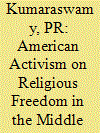

|
|
|
|
|
| Summary/Abstract |
Since its enactment in October 1998, the International Religious Freedom Act has become a major instrument to further the American foreign policy agenda in the Middle East and elsewhere. While the annual reports are a great source of information on lesser-known facts and shifts concerning religious minorities, they also underscore an inherent bias in favour of Christian missionaries, politicization of the minority question and American exceptionalism. Until there is an inclusive alternative, the Religious Freedom Reports of the US State Department are a good source of information to be used with caution.
|
|
|
|
|
|
|
|
|
|
|
|
|
|
|
|
| 2 |
ID:
129259
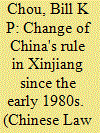

|
|
|
|
|
| Publication |
2012.
|
| Summary/Abstract |
During the reform era, the Chinese government's policies in Xinjiang have changed from accommodating to hardening. The alienation of ethnic minorities caused by the Cultural Revolution necessitated loosening of controls on cultural and religious freedom. With increasing incidents of disturbance leading up to the late 1980s, however, the Chinese government became more coercive on internal security and more generous with economic and development assistance. The global war against Islamic terrorism allowed China to justify a crackdown on the re-sistance in Xinjiang. The 2009 Ürümqi riot proved that the government's policies had failed to stabilize the region, but the Chinese government's countermeasure was to step up, not drop, the repressive policies
|
|
|
|
|
|
|
|
|
|
|
|
|
|
|
|
| 3 |
ID:
116489
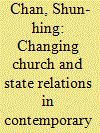

|
|
|
|
|
| Publication |
2012.
|
| Summary/Abstract |
This study examines church-state relations in Mindong diocese, Fujian province, from the perspective of state-society relations. The article seeks to identify the salient patterns of church-state relations in Mindong diocese, and the social factors that contribute to the formation of such patterns. I elaborate on the essential characteristics of the Mindong model in the paper. I argue that the three key factors affecting church-state relations in Mindong diocese are the competition between the open and underground churches, the mediating role of the Vatican, and the pragmatism of local government officials. I describe the Mindong model as a "negotiated resistance," meaning that the underground church resists the control of the government and seeks organizational autonomy through continued negotiation with officials of the government. In conclusion, I discuss the implications of this church-state model in advancing religious freedom in Chinese society.
|
|
|
|
|
|
|
|
|
|
|
|
|
|
|
|
| 4 |
ID:
188944
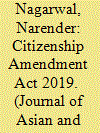

|
|
|
|
|
| Summary/Abstract |
The primary endeavor of this paper is to illuminate the contentious Citizenship Amendment Act 2019 through the constitution and human rights jurisprudence perspective. In this paper, an attempt has been made to propose a different interpretation of the Citizenship Amendment Act 2019 which not only infracts constitutional values but also legalized the hate against minorities, especially Muslims. India—as a nation state—has always cherished and remained concerned about its secular and democratic character. Since independence, India has maintained its global position as a responsible and humane society to protect minorities’ rights and social justice. Shockingly, the legislative development that had taken place in the recent past has questioned India’s commitment toward the certain principle of human rights, democratic values, and secularism which are the hallmark of the Constitution of India. The Citizenship Amendment Act 2019 has put religion as a pre-requisite qualification if someone is desirous to apply for Indian citizenship which is purely a violation of the basic ethos of the constitution. The idea of India as envisioned by the framers of the Indian constitution as a democratic, secular, and socialist state and anything that contrary to its basic structure is unconstitutional. The contentious legislation whether unconstitutional or not needs to be examined through the prism of constitutional law and fundamental norms of human rights. In this research exercise, a modest attempt is made to examine all merits and demerits of this antagonistic citizenship legislation. Throughout the paper, the effort has been given to sustain the notion that India cannot be a republic founded on discrimination, hate, and a pervasive sense of fear.
|
|
|
|
|
|
|
|
|
|
|
|
|
|
|
|
| 5 |
ID:
160072
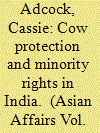

|
|
|
|
|
| Summary/Abstract |
Recent efforts to prevent cow-slaughter in India have prompted U.S. concern about violations of religious freedom. But although the politics of cow protection poses a significant threat to disadvantaged groups in India, efforts to ameliorate that threat through an international policy of religious freedom also carry serious risks. This paper reviews reports issued by the U.S. Department of State's Office of International Religious Freedom and by the U.S. Commission on International Religious Freedom. It argues that by unnecessarily portraying the politics of cow protection in terms of a stark conflict between Hindus and Muslims, they threaten to undermine the goal of reducing anti-minority discrimination and violence in India.
|
|
|
|
|
|
|
|
|
|
|
|
|
|
|
|
| 6 |
ID:
191893
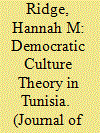

|
|
|
|
|
| Summary/Abstract |
For a decade, Tunisia was identified as a democratic enclave in a non-democratic region. This article examines public opinion in Tunisia in the context of democratic culture theory. Using a 2021 survey study and cluster analysis it finds that support for electoral democracy is separable from support for liberal values. There are liberal democrat and liberal non-democrat populations. Overall, the democratic culture outstrips the support for democratic elections.
|
|
|
|
|
|
|
|
|
|
|
|
|
|
|
|
| 7 |
ID:
121922
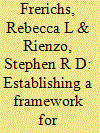

|
|
|
| 8 |
ID:
107410
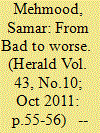

|
|
|
| 9 |
ID:
149310
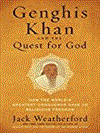

|
|
|
|
|
| Publication |
New York, Viking, 2016.
|
| Description |
xxiii, 407p.:mapshbk
|
| Standard Number |
9780735221154
|
|
|
|
|
|
|
|
|
|
|
|
Copies: C:1/I:0,R:0,Q:0
Circulation
| Accession# | Call# | Current Location | Status | Policy | Location |
| 058913 | 323.44/WEA 058913 | Main | On Shelf | General | |
|
|
|
|
| 10 |
ID:
188439
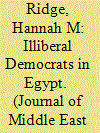

|
|
|
|
|
| Summary/Abstract |
Despite years of high expressed support for democracy in the Middle East, recent social movements have not resulted in durable democratization. Egypt, in particular, experienced an authoritarian reversion under a military coup. This article addresses Egyptians’ support for democracy in the context of Democratic Culture Theory. Using an original survey in Egypt and machine learning, it finds that support for liberal values and support for elected government function independently in Egypt. A large minority of the survey respondents were liberal democrats, but the Egyptian public also includes sizable blocs of illiberal democrats and liberal non-democrats. These results suggest that, although there is real support for democracy in Egypt, there is less commitment to the values that can sustain democracy.
|
|
|
|
|
|
|
|
|
|
|
|
|
|
|
|
| 11 |
ID:
117456
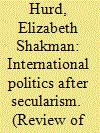

|
|
|
|
|
| Publication |
2012.
|
| Summary/Abstract |
At the height of the influence of the secularisation thesis religion was understood to be absent from affairs of state and the law, including international politics and international law. As the critique of secularisation gained momentum this master narrative fell apart, and a new consensus began to take shape. The notion that religion had been ignored and should be 'brought back in' to International Relations took centre stage among many academics and practitioners. The assumption is that restoring religion in the right way will help address the problems associated with having ignored religion in IR, paving the way for the marginalisation of violent religion and globalisation of religious freedom. This article undertakes a critical analysis of this restorative narrative and the religious and political world it is creating. It then proposes a different approach to the intersection of religion and world politics after secularism. This approach draws attention to the authority of transnational actors such as the United States, United Nations, and European Union to shape the public administration of religious affairs globally. Channels through which this is accomplished include the promotion of religious freedom, humanitarian intervention, foreign aid, nation building and democratisation, counterterrorism and peace-building efforts, and the pronouncements of supra-national courts.
|
|
|
|
|
|
|
|
|
|
|
|
|
|
|
|
| 12 |
ID:
186311
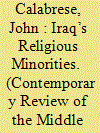

|
|
|
|
|
| Summary/Abstract |
The Middle East and North Africa (MENA) is often described as the cradle of the three Abrahamic faiths and Iraq as a land “where faith was born.” But the past two decades have dealt a severe, possibly fatal blow to religious communities that were once vibrant and integral parts of Iraq’s social fabric—and perhaps to the very idea of pluralism in the region. Ensuring the continued presence of religious minority communities is vital to preserving Iraq’s social diversity and nurturing a culture of pluralism. Iraq’s best hope to save its vanishing minorities from extinction and revive religious pluralism lies in the Iraqi Region of Kurdistan (IRK). Fully incorporating displaced non-Muslim components of Iraqi society into host communities in the IRK while preserving their distinctive collective identity would advance the prospects for the survival of religious minorities and the future of pluralism in the IRK, the country at large, and the wider region.
|
|
|
|
|
|
|
|
|
|
|
|
|
|
|
|
| 13 |
ID:
156096
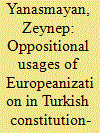

|
|
|
|
|
| Summary/Abstract |
The European Union has traditionally played an anchoring role in Turkey, pushing the Republic towards the enhancement of fundamental rights and freedoms. However, the decreasing credibility of the project for EU membership after 2005 has gradually led to selective reforms being introduced, and most recently to de-Europeanization. Against this quickly changing background, this paper seeks to investigate the usages of Europeanization by domestic political actors during the discussions on the recently failed constitution-making process (2011–2013). It specifically focuses on deliberations over religious freedom, and argues that Europeanization has continued to serve as the normative context in constitution-writing.
|
|
|
|
|
|
|
|
|
|
|
|
|
|
|
|
| 14 |
ID:
099939
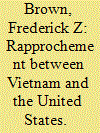

|
|
|
|
|
| Publication |
2010.
|
| Summary/Abstract |
The improvement of bilateral relations between Vietnam and the United States has added a fresh dynamic to the geopolitics of Southeast Asia. This article discusses the laborious process of normalization of political relations between 1976 and 1995. It describes the course of economic normalization from the signing of the Bilateral Trade Agreement in 2001 and granting of Permanent Normal Trading Relations in 2006 to Vietnam's accession to the World Trade Trade Organization in 2007. ...
|
|
|
|
|
|
|
|
|
|
|
|
|
|
|
|
| 15 |
ID:
122527
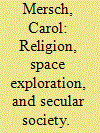

|
|
|
|
|
| Publication |
2013.
|
| Summary/Abstract |
This article concerns the efforts of Reverend John M. Stout and the Apollo Prayer League to land microfilm copies of the Christian Bible on the lunar surface during the Apollo era. The efforts of Stout, a NASA information scientist and industrial chaplain who orchestrated the years-long undertaking, underscored manned spaceflight not only as a technological and geopolitical achievement, but as a collective spiritual quest. The venture was countered at the time by the renowned head of the American Atheists, Madalyn Murray O'Hair, who insisted that religious artifacts and observances had no place on state-sponsored, taxpayer-funded missions. Stout believed that the astronauts themselves had rights guaranteed by the First Amendment. The rancorous debate between Stout and O'Hair, which was played out in the media, laid bare the innate conflict between personal religious freedom and the specter of state-sponsored religion in a secular society making its first expeditions into deep space.
|
|
|
|
|
|
|
|
|
|
|
|
|
|
|
|
| 16 |
ID:
081178
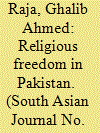

|
|
|
| 17 |
ID:
148063
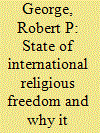

|
|
|
|
|
| Summary/Abstract |
One of America's—more precisely, one of Philadelphia's—greatest contributions to the world is freedom of conscience, the idea that people should be free to practice their religion—or not to practice at all. Today, as ISIS gives people the choice to die or convert, while others in various parts of the world flee for their lives because of different varieties of religious intolerance, one of the leading advocates of international religious freedom reports on the state of religious freedom in the world.
|
|
|
|
|
|
|
|
|
|
|
|
|
|
|
|
| 18 |
ID:
094849
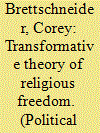

|
|
|
|
|
| Publication |
2010.
|
| Summary/Abstract |
Religious freedom is often thought to protect, not only religious practices, but also the underlying religious beliefs of citizens. But what should be said about religious beliefs that oppose religious freedom itself or that deny the concept of equal citizenship? The author argues here that such beliefs, while protected against coercive sanction, are rightly subject to attempts at transformation by the state in its expressive capacities. Transformation is entailed by a commitment to publicizing the reasons and principles that justify the basic rights of citizens.
|
|
|
|
|
|
|
|
|
|
|
|
|
|
|
|
| 19 |
ID:
158923
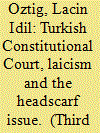

|
|
|
|
|
| Summary/Abstract |
From 1989 onwards, the Turkish Constitutional Court justified the headscarf ban in universities by citing laicism. Interestingly, in 2014, the Court found the headscarf ban in courts unconstitutional and revoked it by again citing laicism as the main reason. How can this seemingly paradoxical practice be explained? This article traces the trajectory of the headscarf issue in Turkey by analysing and contextualising the Constitutional Court decisions. In order to explain how and why the Constitutional Court issued two opposing views of the headscarf ban, this article focuses on the changing political climate and legal developments that took place in Turkey between 2008 and 2014.
|
|
|
|
|
|
|
|
|
|
|
|
|
|
|
|
| 20 |
ID:
061394
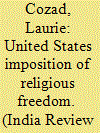

|
|
|
|
|
| Publication |
Jan 2005.
|
| Summary/Abstract |
The International Religious Freedom Act (IRFA) of 1998 was founded in order to address the global problem of religious persecution. While this is undoubtedly a worthy goal, any nation’s unilateral action dealing with religious persecution is bound to be undermined by its own particular cultural biases. It is therefore interesting to examine the IRFA as it has been applied to a country such as India, for such an analysis reveals the following: those charged with the implementation of the IRFA proceed from specific ideological motivations that, at certain times and in certain contexts, result in the privileging of particular religious groups over others. This article thus has two goals: first, to explore the IRFA and the cultural assumptions which guided its formation and continue to govern its implementation; second, to analyze the problematic as well as the potentially beneficial aspects of the IRFA as it enters into a religio-political landscape very different from that in which it was conceived.
|
|
|
|
|
|
|
|
|
|
|
|
|
|
|
|
|
|
|
|
|